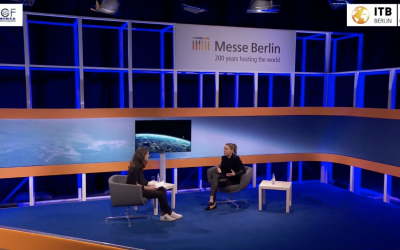Executive interview with Airbnb at ITB Berlin Convention 2022
- Kathrin Anselm, General Manager, DACH, CEE & Russia, Airbnb
- Lea Jordan, techtalk.travel
Adaptability was the key takeaway from an executive interview with Airbnb’s Kathrin Anselm during the ITB Berlin Convention on Wednesday, 9 March, 2022.
When asked how Airbnb has managed to achieve impressive revenue growth during the COVID-19 pandemic, Anselm, who is General Manager of the company’s DACH, CEE and Russia regions, attributed the growth to the company’s “adaptable” business model and “design-driven” core.
This adaptability is credited for allowing Airbnb to respond to – or take advantage of – what the company calls the “Live Anywhere Travel Revolution”. This revolution was declared by CEO and Co-founder Brian Chesky in January 2022 when he announced that “he too will live on Airbnb”.
Driving the revolution is, according to Airbnb, “the first time millions of people can now live anywhere”. This refers mainly to office-based employees and their employers having successfully utilised remote and flexible work arrangements during the COVID-19 pandemic – arrangements that have changed the use and value of fixed offices. Further fuelling the “Live Anywhere Travel Revolution” is what Anselm referred to as a “super trend,” longer stays.
Anselm explained the company has responded with “constant product innovation”. These innovations include easier listing for hosts, as well as insurance coverage. On the guest side, search improvements, particularly around flexible travel, allow guests to take advantage of their own live/work flexibility.
When asked about the “secret sauce” of Airbnb’s brand strength, Anselm noted that 90% of the company’s traffic is direct and that the company had reduced paid search marketing in favour of investments in “dedicated” brand-building campaigns around guest experience. One could argue that Chesky’s announcement that “he too will live on Airbnb” is also a strong brand signal, suggesting that Airbnb is for anyone living (and working) through the revolution, not just quirky nomadic flashpackers or “live like a local” tourists.
To close out the interview, Anselm was asked for her thoughts about the pandemic’s impact on leadership style. Three guiding principles from her playbook are:
- Trust in teams or “learning to let go” and “not control, but lead”
- Choosing a growth mindset and accepting that “leading is about constant learning”
- Accepting some responsibility for the mental health of your employees.
Anselm’s key learning at Airbnb during the pandemic? See “community as your superpower” and work at “eye level” with your partners.
WYSE does it matter?
Buzzwords like “purposeful,” “asset-light,” “hybrid” and “revenge travel” are the current lingo of a travel industry trying to make sense of what the COVID-19 pandemic means for its future. For lifestyle brands like Airbnb they form the basis of a “revolution” – one that the company has a clear role and interest in facilitating.
However, these concepts have been developing in travel for a while now, some with a different label. In fact many were analysed, with 15 years of primary data collected by WYSE Travel Confederation, in relation to the youth and student travel market in New Horizons IV: A global study of the youth and student traveller (2018).
Today’s “revenge travel” was yesterday’s “global mobility” + “splurging” = “meaningful experience”. Yesterday’s homestay is today’s “cosy room with Superhost”. The concepts speak to the constantly evolving ways that people live, work and spend their leisure time in an ever-more connected world. The ability to adapt to and take advantage of changes can serve companies and individuals alike very well – “revolution” or not.
More reading for organisations dealing in youth and student travel:
New Horizons IV: A global study of the youth and student traveller (2018)
- “Gone digi-nomad: Tracking the unwired traveller”
- “The original ‘live like a local’ traveller”
- “Blurred vision”
- “From travel to global mobility”

